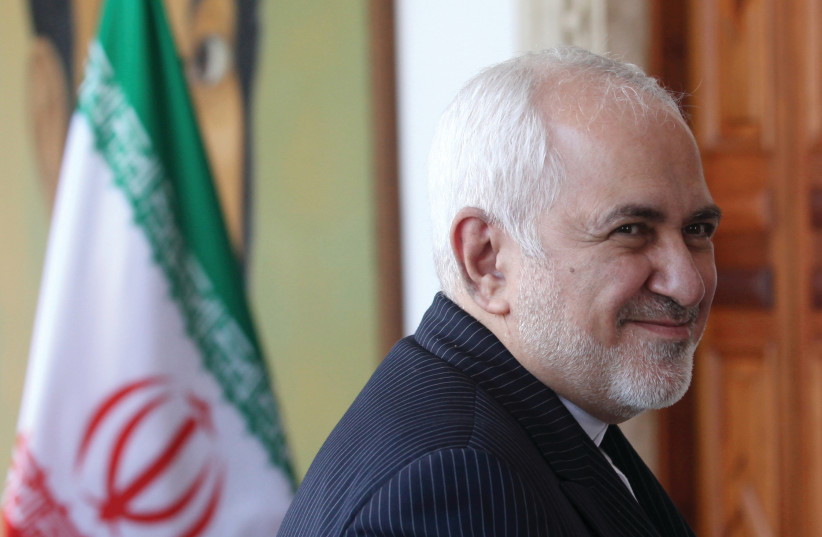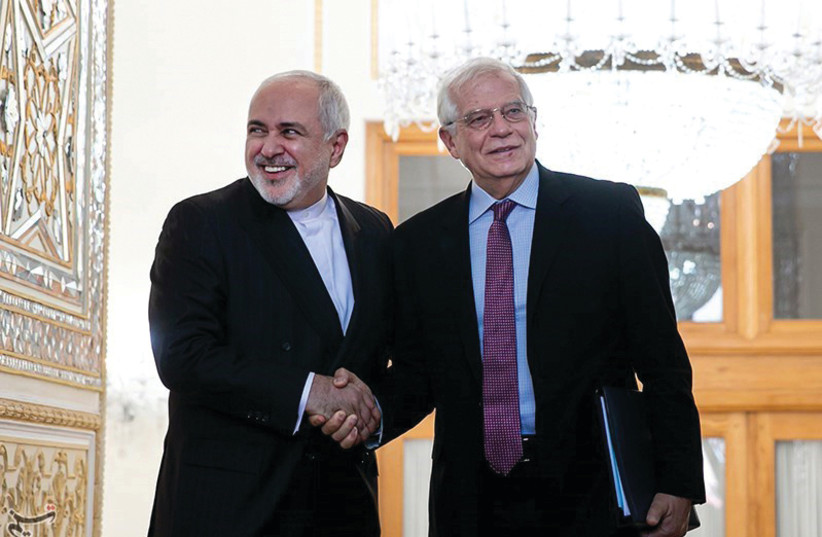Iran’s former foreign minister Javad Zarif has revealed that he believed Israel has some kind of control over Hollywood, that he expected Iran to get a huge payout if it signed the 2015 Iran deal, and that Israel has become closer to the Arab states. An article at Iran’s Fars News claims to provide insight into Zarif’s views via a new video circulating online and Zarif’s discussions with students.
Zarif used to be the toast of the town in Western capitals. In the days before and after the Iran deal, he frequently held court, in meetings in the West and via his social media activity. He rarely had to answer tough questions. It turns out now that it was in Iran where he faced his greatest challenges. While he was adored among many officials in the West, he was not so much liked at home.
The former foreign minister remains one of the key charlatans behind the Iran regime’s diplomacy. To the West he showed one face, the smiling diplomat pretending to be a moderate, while at home he had to pretend to be a partner of the Islamic Revolutionary Guard Corps – it was never entirely clear what he believed.
The new report from Fars News should be seen in the context of the IRGC’s views that Zarif was not trustworthy. This is because the Guard Corps and many allies of the current president of Iran appear suspicious of Zarif because of his frequent trips to the West.
The comments by Zarif are interesting. First of all, he appears to believe that European countries would stand by the Iran deal. He trusted in the UK, Russia, Germany and France. The article notes that “critics of the JCPOA had repeatedly pointed to the complicity of Europe with the US and the role of the Europeans in the JCPOA.”

But Zarif has a different view. He trusted the Europeans because he believed the US is substantially different than Europe. He says that many US senators had never travelled abroad before obtaining office. In short, Zarif believes the US to be governed by ignorant people, which is why he believed he could run circles around them in negotiations.
Selling the Iran Deal
IT IS NOW widely known that the Iran deal was sold to the US via a media campaign that involved hundreds of op-eds in 2014 and 2015. These op-eds and other commentators laid out a simplistic narrative of “a deal or war.” Those who opposed the deal were said to be “pro-war.” Even though it was never clear why absence of a deal would mean war, this narrative was pushed. It was likely Zarif coordinating with friends in the US to push these narratives.
Another narrative the then-foreign minister played up was the assertion that Iran’s regime includes moderates and hardliners. This talking point only exists for Iran. It is argued that if the US doesn't “help” the moderates like Zarif, then the “hardliners” will come to power. In reality, the regime is only hardliners and they all basically agree on most issues.
Zarif did have some views that contrast with the current leadership in Tehran. He did believe Iran could get concessions from the West and he did not invest in the Russia-China relationship. Today’s Iran sees more of a future in ties with China. Zarif is accused, in the report, of asserting that Russia only began cooperating with Iran in Syria after 2015. In fact, Moscow entered Syria in 2015 after Qasem Soleimani encouraged it to do so.
“Zarif does not mention the role of IRGC Quds Force in supporting the Syrian government against the Wahhabi and Takfiri groups, and the cooperation between Iran and Syria is part of this direction,” notes Fars News. On this issue, the Fars report is more consistent with chronology: it was Iran that entered Syria and encouraged Hezbollah to intervene in 2012. This means that the Islamic Republic prodded Russia to go into Syria, where the IRGC was already located.

Zarif argues, correctly, that the US role in the Middle East was cemented by the Gulf war. The US then embarked on an attempt to be the world’s only superpower and its "goal”, Zarif says, was a new world order. “In another part of this meeting, Zarif mentioned the developments after September 11 and America's attempt to institutionalize its power in Afghanistan,” the report says. He argued that Washington attempted to make the world a partner in fighting its enemies and that Israel benefited from this.
Enemy of the Arab world?
THE FORMER foreign minister claims that “Israel is the enemy of the Arab world" – although that view has changed – "and has gradually turned Iran into an enemy of the Arab world by creating narratives, and [Israel] has removed itself from the enmity.” This is important because Zarif believes that the Jewish state was able to successfully convince Arab states that Tehran is the real threat, not Israel. Indeed, Israel today shares interests with many Arab countries while Iran is busy destroying and bankrupting Iraq, Lebanon, Yemen and Syria.
Zarif correctly understood that Israel is now an ally of the Arab world. The pro-Iran lobby in the US sought, after 2008, to reconfigure American policy into a pro-Iran stance. This belief system sought to jettison traditional US partners such as Saudi Arabia, Israel, Turkey and the Gulf. The shift meant that Washington needed the Iran deal to beg Tehran to be more amicable to the US.
The goal of these “Iran dealers” was a massive policy shift. This helped set in motion a closer relationship between Israel and the Gulf and eventually resulted in the Abraham Accords. But Iran in fact pressed its advantage too much during the Obama era. It believed the US would leave the region and end its ties to its traditional friends and Iran could enter the vacuum. But the ruin that it brought through its actions led many countries to fear it even more.
For pro-Iran deal types like then-Secretary of State John Kerry, the prospect of Israeli ties with the Gulf was considered a “no”, because the US at the time wanted a “Palestinians first” approach. Israel was beginning its "war between the wars" campaign and was focused on third circle threats. Kerry had apparently seen the possibility of better ties with Iran for many years, ever since he lost the 2004 election. Zarif saw in Kerry the ability to finally influence US policy in the region.
Iran Deal fictions
ZARIF BELIEVES that Israel is an oppressive state but he notes that it has successfully proven one of its narratives, which is that it is invincible. This is what he says. He believes that Jerusalem sells this narrative via film. “Zarif went on to say that there is no film against the usurping Israeli regime in Hollywood, saying… every movie Hollywood makes shows the Israeli and American soldiers as invincible.” He said that one of the only threats to Israel today is population and demographics, noting the “increase in the Arab population in Israel.”
The former foreign minister also claims that he enjoyed his talks with John Kerry. He even narrated “jokes” the two had together, according to Fars News. “Kerry used to say ‘if you sign the JCPOA, they will come to Iran so much… They will invest [so fast] that you won’t have time to issue visas for them.’” Zarif responded, “we have an expression in Farsi – we say 'don't put watermelon under our arms.' From now on whenever you want to say something to make me laugh, I say 'don't put watermelon under our arms'! I know what investment products are in Iran, don't tell me they are lining up to invest.”
This bizarre exchange appears to show the US trying to sell Iran on the deal with images of wealth flowing to the Islamic Republic. This is strange because Iran could have simply not developed an illegal nuclear program and rather behave like other states – and then it would have received investment. Iran chose the extremism factor.
Zarif also critiques claims that he could have saved the JCPOA by not relying on the White House to implement it. He argues that the nuclear deal’s real power was in the “snapback” clauses, and asserts that “our nuclear situation in September 2021 is better than in September 2013.”
The former foreign minister also slammed Mohsen Fakhrizadeh, the nuclear program leader and scientist who was assassinated allegedly by Israel in November 2020, for not adhering to his security detail’s requests. This claim is interesting but it is hard to verify. “Fakhrizadeh didn't listen, which means Israel could hit him whenever it wanted,” Zarif is quoted as saying. He says the nuclear scientist's death was a setback to the Iran deal.
The full details of the Fars News report are hard to verify and it remains to be seen if it is accurate and if the shocking details were indeed said in such a manner by Zarif. For now, the report is a window into the regime's infighting and differing worldviews in Tehran.
